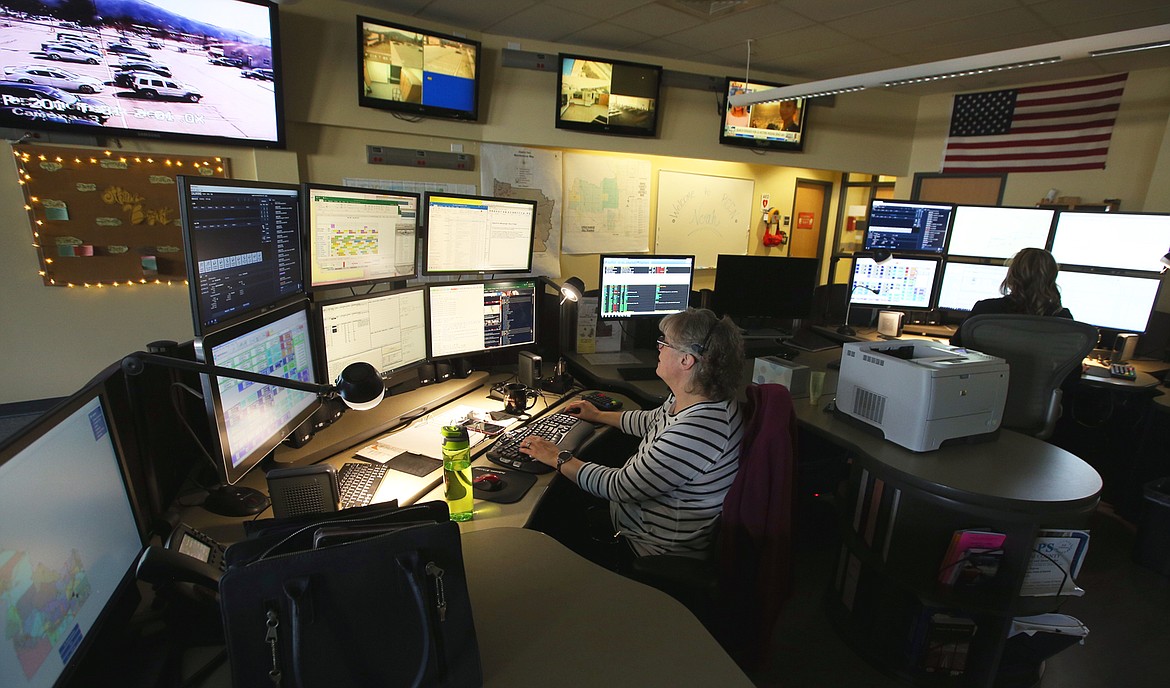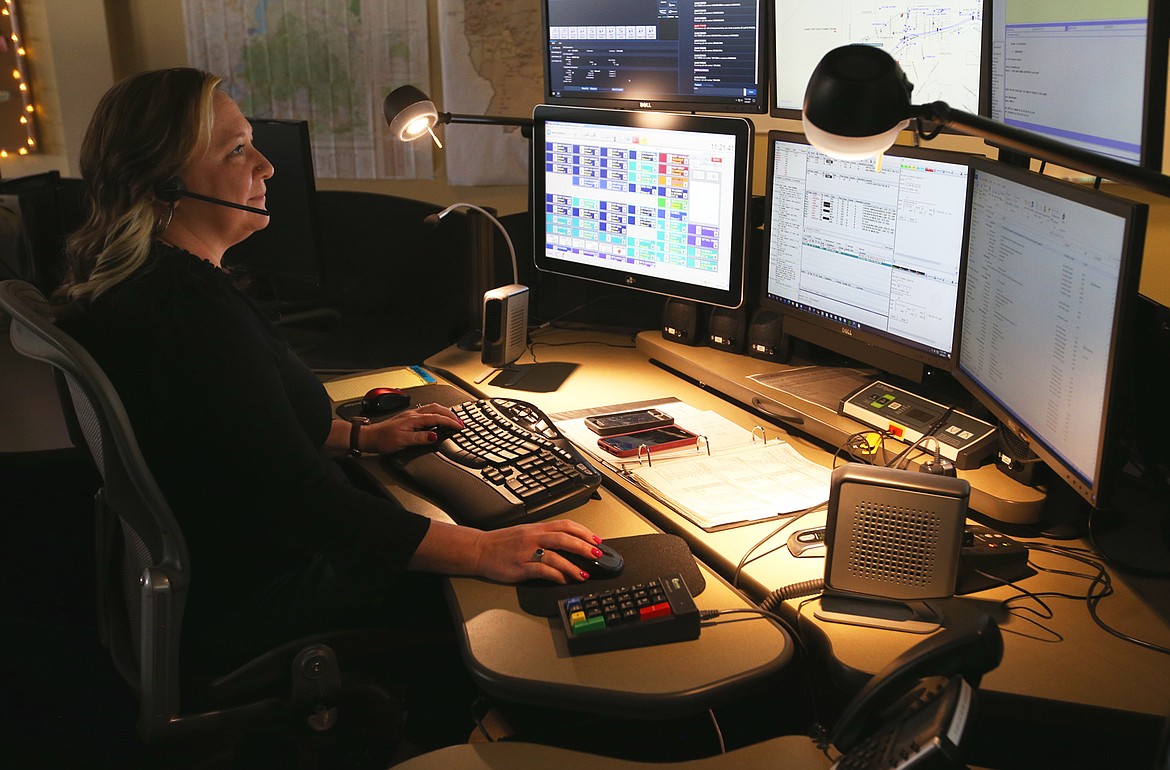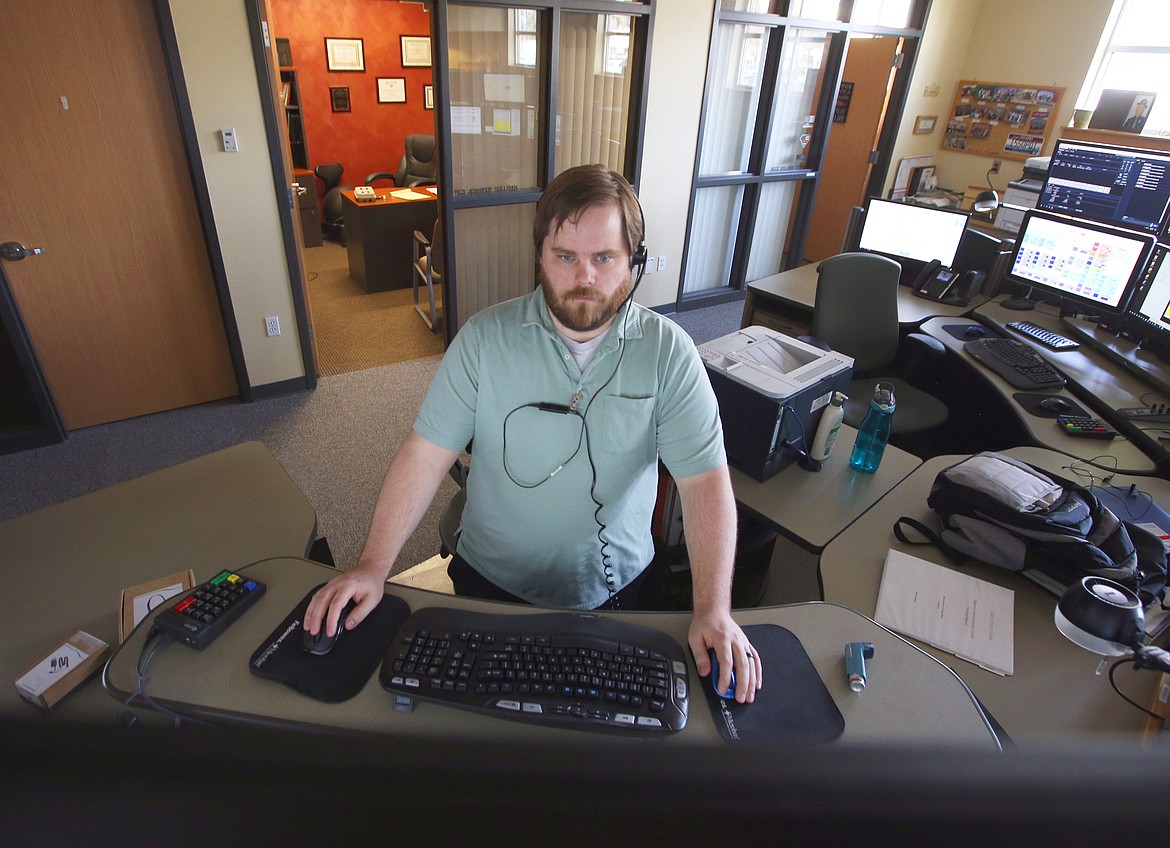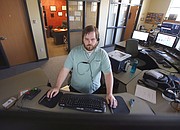Voices to count on
COEUR d’ALENE — They are commonly known as dispatchers.
But emergency communications officers is more accurate.
And Idaho State Police Sgt. Allen Ashby has an even better title for them: “Unsung heroes.”
“We have the best,” he said Friday at ISP headquarters on Wilbur Avenue. “They really do an outstanding job.”
They are the first responders who receive the calls to law enforcement, calmly collect information, and relay it to officers and troopers. They are critical to the success and safety of those in the field.
They do more than most people know. They are on the front lines when there are accidents and emergencies. Yes, they get the location and the basics of what happened, but depending on the situation they may need to ask lots of questions of the caller. And they do.
What do they see? How many people are involved? What are they doing? What direction are the vehicles traveling?
The answers let emergency communications officers know how many officers to send to a scene and what resources are needed.
“It’s the starting point,” Ashby said.
While ISP’s troopers are the faces in the field, dispatchers are the voices they rely on — and often in times of crisis. They are heard, but not seen.
Their work is done over the phone and radio waves with split-second decisions, at all hours of the day and night, with precision and courtesy, under tremendous pressure, wrote Melissa Stroh, ISP’s regional communications center coordinator.
These professionals “help save countless lives by answering emergency calls, dispatching emergency personnel and equipment and providing compassion and support to callers in distress,” she wrote.
Ashby agreed they play a key role for officers and those they are answering over the phone.
He said a good dispatcher is inquisitive and a digger, able to ferret out additional facts and information about a situation or a suspect. Their questions and the answers to those questions, he said, can determine a trooper’s actions in the field, perhaps even save a life.
“They get it right nearly 100 percent of the time,” he continued. "That’s what makes them so valuable. No one really notices unless something goes wrong, but they get it right.”
ISP and other agencies are honoring emergency communications officers during National Public Safety Telecommunicators Week, April 11 - 17.
ISP’s two Regional Communications Centers provide service to all of Idaho and are considered lifelines to officers working alone in the rural parts of the state with backup often an hour or more away.
These centers do not just dispatch for ISP, Stroh said. They serve a number of state and federal agencies. Regional Communications Center North is located in Coeur d'Alene and covers ISP's two northern districts, which includes the 10 northern counties and 6,211 road miles.
The celebration also recognizes the technicians that maintain radio and emergency phone systems, communications staff trainers, communications center personnel, and other public safety telecommunications staff across the country "who work tirelessly, often behind the scenes, to help the public and public safety personnel during emergencies."
The Kootenai County Sheriff’s Office also praised 25 “hardworking and dedicated emergency communications officers that cover our 911 center 24 hours a day every day of the year."
According to a KCSO press release, its 911 center dispatches for 14 agencies comprised of fire, medical and law enforcement within Kootenai County. For 2020, the 911 center handled 158,314 calls for service. Of those, 41,926 were 911 calls. From these calls for service, 133,900 were processed and sent as calls to be dispatched to the primary agency.
“Being a 911 dispatcher is a very rewarding job and the lifeline for first responders, who could not do their job without them,” the release said. “We thank you for your service to the community and all the first responders you serve.”
Mary Conrad was working at ISP’s communication center in Coeur d’Alene on Friday. She has been an emergency communications officer 26 years and has been with ISP since 1997.
Some days, it’s quiet. Others, the phone doesn’t stop ringing with reports of crashes, road rage, accidents and medical mishaps.
Flexibility and being able to think fast is key.
“You have to be able to roll with the punches,” Conrad said.
Some situations require dispatchers to calm frightened callers at a crash site by getting them to take a breath and tell them what is going on.
“They just need to have someone to talk to,” she said.
Despite the high stress at times, Conrad likes her work.
“It’s definitely very fulfilling. You get to help solve stuff that maybe you find that one little piece of the puzzle that’s missing,” she said.
Mark Wise, a senior ISP dispatcher and trainer, enjoys making a difference and helping people. But it’s not easy.
“You can get a little jaded because a lot of times you talk to people when they’re having their worst day,” he said.
He likes knowing that at the end of the day, “you helped make sure that somebody on the road gets to go home safely to their family. That’s a huge boost to what you’re doing.”
Being an emergency communications officer, Wise said, is more than answering phones.
“This job can take a toll on you, mentally, emotionally, physically. It can wear at you,” he said. “It can leave lasting impressions.”
Stroh said ISP usually has two to three emergency communications officers on duty at one time. They monitor multiple screens — the phone system, radio channels, 911 calls, license plate readers, locations of accidents, security cameras around the building, even the news. It’s also recorded by what is called computer-aided dispatch.
“Everything we do, everything the troopers say, everyone we run, is all put into that system. It’s all retrievable for public record,” she said.
Stroh said emergency communications officers must be self-motivated and able to do multiple things at once. They are answering, talking and juggling calls continually in a fast-paced team environment.
“A lot of people can’t do that, can’t listen to a phone call and listen to the radio at the same time,” she said.
So intensive is the ISP training that from the time a dispatcher is hired to when they actually work on their own can be at least four months. It’s a difficult, demanding profession.
“I know all of our local centers are running short,” Stroh said. “That’s a lot of high stress.”
Jennifer Sullivan, ISP emergency communications officer supervisor, has been in this field 21 years. She likes knowing that with some calls, she diffused a situation or got someone to calm down.
“I’ve had people call me back and tell me thank you. Usually, you don’t get that,” she said.
There can be frustrations not seeing how situations work out.
“It’s like we almost have a book where we don’t get to read the last chapter because we start the book, but then the officers finish the book," Sullivan said. "So we don’t get to hear the ending. So I really appreciate our troopers here. They come in and tell us, ‘This is what happened on scene.’"
“It kind of closes that up,” Sullivan continued. “It kind of zips it up a little bit. ‘OK, I did something good.’”
She takes pride providing information that makes officers successful in the field.
“If I can go home from my shift knowing that I brought all of my officers home safely, that’s what matters,” she said.
There are calls that stick with her, such as fatality crashes that involve children.
“Those are in my mind a lot, so that’s hard,” she said.
Sullivan has on occasion had tell families a loved one died in an accident.
“All you can do is listen to them sob and cry and try and comfort them,” she said.
She once spent 45 minutes on the phone after a shift comforting a woman whose son had been killed in a crash.
“I probably said the same thing three or four times, but it’s what you do, it’s who you are,” she said. "You go home drained, physically, emotionally, mentally drained, but at the same time, you know you gave some sort of comfort to them.”
Sullivan said “Nobody ever calls us when they’re having a good day. It’s generally bad."
She and her colleagues are up for the challenge.
"If you can help them work it out and make them feel better, that they’re getting some help, then I’ve done my job," she said.







